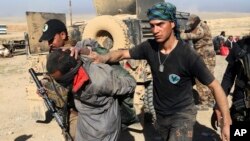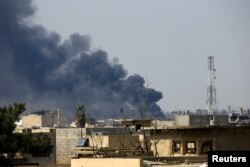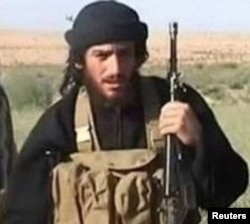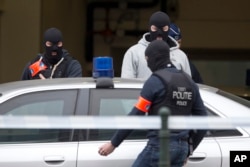Collapsing Islamic State's self-declared caliphate in Iraq and Syria will not be enough to slow the terror group's plots against the West and elsewhere, according to multiple U.S. and Western officials.
U.S. officials, in particular, are bracing for what could be a "significant lag" between the time Islamic State is routed from its remaining holdings in Iraq and Syria and when its brand and loyal operatives cease to pose a serious global threat.
"The very welcome defeat of ISIS's army-like capabilities in Iraq and Syria will not bring an end to the global terrorist attack threat that ISIS poses," Lieutenant General Michael Nagata cautioned Wednesday, using an acronym for the terror group. Nagata is the strategic operational planning director at the National Counterterrorism Center, a division of the U.S. intelligence director's office.
"ISIS's ability to export its ideology, its resources and people, and its intent to attack, they have demonstrated a global ability to do all these," Nagata told an audience at the Center for Strategic and International Studies, a Washington public policy research group. "They will continue to do so."
European officials, especially those from countries already victimized by IS plots, are equally alarmed as they stare down a complex set of threats that, for the moment, have been networked under the terror group's banner.
The challenge, many say, is Islamic State's approach to command and control, which is an organization's ability to exercise authority over a given area.
Operatives, supporters
Officials think the group's external plotters rely on carefully cultivated operatives with specific instructions and on loose networks of supporters, whom the plotters are constantly trying to inspire to act on their own. There also is a possibility the two groups overlap, sometimes in ways that may be difficult to foresee.
"ISIS remains a dangerous enemy," a U.S. National Security Council official told VOA on condition of anonymity, noting the ongoing White House review of the country's anti-IS strategy.
A key part of that review, the official said, has been "to understand and prepare for the evolution the group might undertake."
On the surface, there seems to have been little change in the terror group's approach, with IS leaders and supporters continuing their drumbeat of calls for attacks on the West.
"To the supporters of the caliphate in America, Russia and Europe, the enemy's interest can easily be targeted by you," IS spokesman Abu Hassan al-Muhajir said in an audio message published Tuesday on social media. "Make the enemy busy with itself so they can be distracted from targeting the nation of Islam."
At the same time, IS propagandists have been trying to capitalize on attacks when they happen, like the one by Khalid Masood, 52, late last month on Westminster Bridge in London that killed three people and wounded dozens.
British officials have said they think Masood acted alone, although IS claimed responsibility.
"ISIS continues to publicly encourage actions that benefit its cause and distract from its battlefield losses," a U.S. counterterrorism official told VOA, adding that the group also "has shown its opportunism by stepping up its claims of inspired attacks even in cases that do not appear to be connected."
And there are indications IS is trying to ramp up the pressure.
"Following London, the group has increased its efforts to persuade supporters in the West to execute additional attacks," said Michael S. Smith II, a terrorism analyst who has consulted with the U.S. and British governments. "Islamic State officials have been devolving explicit directives to supporters here via the group's propaganda."
Capabilities degraded
But U.S. military officials say efforts on the ground in Iraq and Syria have weakened the terror group's capabilities, noting almost half of IS leader Abu Bakr al-Baghdadi's inner circle has been killed.
Former IS spokesman Abu Muhammad al-Adnani, considered to be the architect of the group's external plots, was one of the first to die, targeted in an airstrike near al-Bab, Syria, last August.
Then in November, a series of U.S. airstrikes killed Boubaker al-Hakim, in charge of plotting attacks on the West, as well as Salah Gourmat and Sammy Djedou, both of whom had been linked to the Paris terror attacks in 2015.
Still, some officials harbor deep concerns that IS may be capable of pulling off a more complex or devastating attack, noting the group has been able to use the past several years to build and entrench its external operations across Europe, while also finding ways to reach into central and south Asia, and even into the Asia-Pacific region.
"They've already dispatched operatives. They may have teams who can attack," said Daveed Gartenstein-Ross, a senior fellow at the Foundation for Defense of Democracies, a terrorism research group in Washington. "The virtual-planner model will remain feasible."
Such concerns have resonated in countries like France and Belgium, which have seen relatively large numbers of residents flock to Syria and Iraq to join IS, while those countries also struggle with Islamist radicalization at home.
"The French are aware that this terrorism will strike again," the French Interior Ministry's Muriel Domenach warned this week during a visit to Washington, pointing to 12,000 active cases tied to radicalization.
And she warned that even those who appear to have acted alone almost certainly had help.
"Most of those we thought were lone wolves proved to be Daesh-inspired or even Daesh-commanded," she said, using the terror group's Arabic acronym.
In neighboring Belgium, authorities have 200 active terror-related investigations, with the number of terror convictions more than doubling since 2014.
"For Belgium, this is a really big number," said Cedric Janssens de Bisthoven with the Belgium Embassy in Washington. "We're in this for the long haul."
Returning fighters
Belgium and other European countries also are deeply concerned about the potential impact of foreign fighters returning from the front in Syria and Iraq.
"We still in Belgium have around 250 [Belgian] fighters in Syria, in Iraq," said Thomas Renard, a senior fellow at the Royal Institute for International Relations, an independent research group in Brussels. "The problem is that those people who will return now, we cannot assume that they return because they are disillusioned. They are returning because there is nothing to be done [in Syria and Iraq]."
Such a return home is probably more difficult now than it once was, with efforts to shut down the flow of foreign fighters to Syria and Iraq also making it more difficult for fighters to move back. Still, intelligence officials note that IS operatives, including some tied to the terror attacks in Paris and Brussels, have successfully used forged documents.
Yet, what frightens U.S. and other Western officials most is that the intelligence has provided "very little precision" about the movements of foreign fighters or other operatives.
"It's hard to identify these people," said Nagata of the U.S. National Counterterrorism Center. "The chaos around Syria ... if you want to hide, you can hide."
"We have to be patient. We are not going to end this threat this year," he added. "I don't think we can identify a time horizon."







